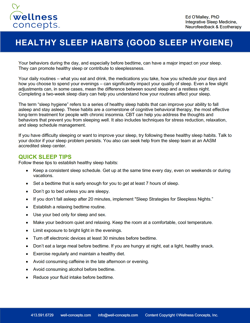Creating healthy sleep habits can lay the foundation for building good habits in other areas of our lives. For tips for improving your sleep habits, read this handout adapted from our seminar Insomnia Diagnosis & Management.
Your behaviors during the day, and especially before bedtime, can have a major impact on your sleep. They can promote healthy sleep or contribute to sleeplessness.
Your daily routines – what you eat and drink, the medications you take, how you schedule your days and how you choose to spend your evenings – can significantly impact your quality of sleep. Even a few slight adjustments can, in some cases, mean the difference between sound sleep and a restless night. Completing a two-week sleep diary can help you understand how your routines affect your sleep.
The term “sleep hygiene” refers to a series of healthy sleep habits that can improve your ability to fall asleep and stay asleep. These habits are a cornerstone of cognitive behavioral therapy, the most effective long-term treatment for people with chronic insomnia. CBT can help you address the thoughts and behaviors that prevent you from sleeping well. It also includes techniques for stress reduction, relaxation, and sleep schedule management.
If you have difficulty sleeping or want to improve your sleep, try following these healthy sleep habits. Talk to your doctor if your sleep problem persists. You also can seek help from the sleep team at an AASM accredited sleep center.
Quick Sleep Tips
Follow these tips to establish healthy sleep habits:
- Keep a consistent sleep schedule. Get up at the same time every day, even on weekends or during vacations.
- Set a bedtime that is early enough for you to get at least 7 hours of sleep.
- Don’t go to bed unless you are sleepy.
- If you don’t fall asleep after 20 minutes, implement "Sleep Strategies for Sleepless Nights.”
- Establish a relaxing bedtime routine.
- Use your bed only for sleep and sex.
- Make your bedroom quiet and relaxing. Keep the room at a comfortable, cool temperature.
- Limit exposure to bright light in the evenings.
- Turn off electronic devices at least 30 minutes before bedtime.
- Don’t eat a large meal before bedtime. If you are hungry at night, eat a light, healthy snack.
- Exercise regularly and maintain a healthy diet.
- Avoid consuming caffeine in the late afternoon or evening.
- Avoid consuming alcohol before bedtime.
- Reduce your fluid intake before bedtime.


